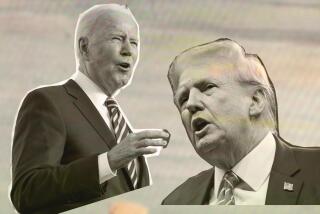Some Costly Numbers
The U.S. Census Bureau decision last week not to adjust the national head count through statistical estimates will make California and particularly Los Angeles huge losers in coming years when federal tax dollars are passed out. The agency’s conclusion might have been different under Kenneth Prewitt, the statistician who ably led the agency through the massive census last April, but the Bush administration had speedily replaced him. Commerce Secretary Don Evans technically could reverse the Census Bureau, but there’s no chance that he will.
The decision by the bureau’s new acting director, William G. Barron Jr., reminds us that many kinds of numbers, not just Florida’s election tallies, have enormous political and economic consequences. The census figures are the basis on which congressional seats are apportioned among the states, state legislative district lines are drawn and $200 billion a year in federal aid is doled out to cities and states. Formulas for spending on highway improvement, health care, immigrant aid, education and an array of services are grounded in census data. Shouldn’t census numbers, then, be as accurate as possible?
The Census Bureau experts on whom Barron relied said that adjusting the 2000 census count might actually overestimate the population. Even if an adjustment would be more accurate, there wouldn’t be enough time before the April 1 deadline to release data that could result in an acceptable estimate, the bureau said.
Because the census is such a huge undertaking, there’s lots of room for error, human and otherwise. In the 1990 census, for example, experts estimate that as many as 4 million people out of a total population of 248 million were not counted. Many were immigrants afraid to respond, minorities and/or the poor. Last year’s census did a much better job, with the undercount believed to be much smaller: 3.3 million out of 281 million.
While demographers think the head count missed only 1.18% of the population nationally, the consequences are great for urban centers like Los Angeles that have high concentrations of minorities, immigrants, poor people and children. The bureau’s failure to correct this undeniable undercount with proven statistical sampling and verification techniques deprives local government of federal aid for each missed person. Lots of federal aid. An independent study by the accounting firm PricewaterhouseCoopers projected that Los Angeles County alone could lose $1.8 billion over the next 10 years.
The 1990 figures spawned unsuccessful lawsuits by Los Angeles and other cities aimed at forcing the bureau to correct the undercount. Several cities, again including Los Angeles, this year filed similar suits, which probably don’t stand a chance. The bureau’s rationale for its decision--that it has insufficient time to determine the undercount, rather than a lack of will--gives Commerce Secretary Evans cover to rebut charges that his approval is political. The political issues grow out of the traditional GOP fear that undercounted people are likely to favor Democrats.
What now? Certainly the California delegation, along with city and county officials, must press the case in Congress for aid to recoup the millions that will be spent in coming years on local services to undercounted children, the working poor and immigrants. Beyond that, if bureau officials truly believe the deadline governing the release of its data precludes a full and accurate count, Congress ought to make sure that deadline is extended.
More to Read
Get the L.A. Times Politics newsletter
Deeply reported insights into legislation, politics and policy from Sacramento, Washington and beyond. In your inbox three times per week.
You may occasionally receive promotional content from the Los Angeles Times.






